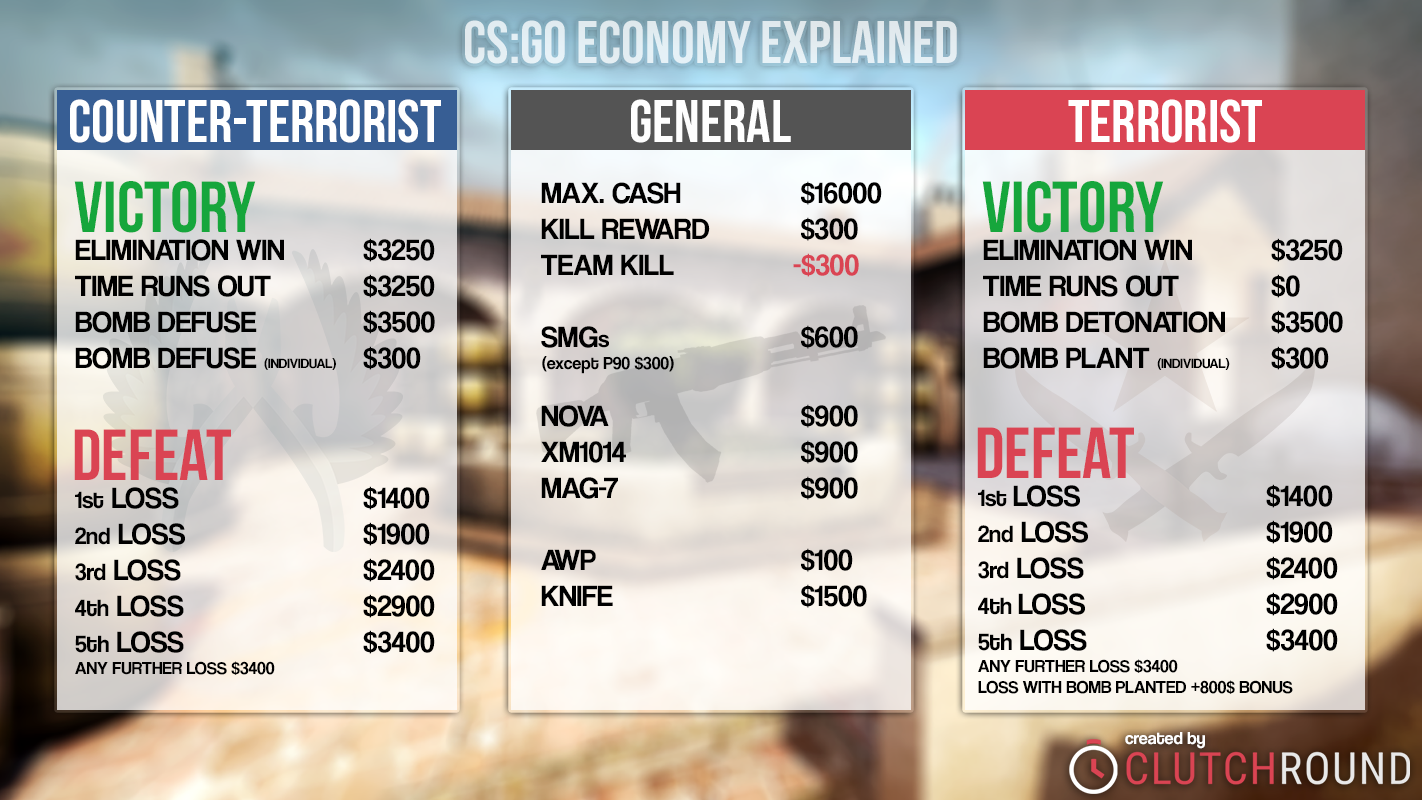CCCam HD Insights
Stay updated with the latest in streaming and tech.
Balancing Act: How CSGO Economy Management Can Save Your Team
Master CSGO economy management to boost your team's success. Discover strategies that can turn the tide in your next match!
Mastering the CSGO Economy: Strategies for Success
Understanding the CSGO economy is crucial for players aiming to achieve success in the game. The economy in Counter-Strike: Global Offensive determines your purchasing power, impacting your ability to buy weapons, armor, and utilities during matches. Each player's financial state is influenced by factors such as winning or losing rounds, getting kills, and completing objectives. To effectively manage your economy, it's essential to practice strategies such as saving when the team is low on funds, or force-buying during crucial rounds. Keeping track of your team’s collective economy will allow you to make informed decisions on when to invest in better equipment and when to prioritize saving for future rounds.
Incorporating a few key strategies can significantly improve your performance by optimizing the CSGO economy. Firstly, consider adopting a balanced buy strategy where players buy what they can afford while still maintaining enough funds for future rounds. Establish clear communication with teammates to decide when to execute a eco-round—a round where players intentionally save money for better gear in subsequent rounds. Another effective approach is to track enemy purchases; if you notice they are saving, you can adjust your strategy to take advantage of their weaker loadout. By mastering these economic principles, you'll not only enhance your gameplay but also pave the way for your team's overall success.

Counter-Strike is a popular first-person shooter game that pits teams of terrorists against counter-terrorists in various objective-based missions. Players can showcase their skills by executing tactics, communicating with teammates, and managing their resources effectively. For example, understanding how to cs2 rethrow last grenade can significantly impact a player's performance in critical moments of the game.
The Impact of Economy Management on Team Performance in CSGO
The impact of economy management on team performance in CSGO cannot be overstated. Effective economy management allows teams to make strategic decisions on when to buy weapons, armor, and utilities, which can significantly influence the outcome of rounds. Teams that excel in managing their economy are often able to maintain a competitive edge by ensuring they are properly equipped during critical rounds, thus increasing their chances of winning. As such, understanding the intricacies of the game's economy becomes a pivotal element in a team's overall performance.
Furthermore, economy management is not just about individual players making the right financial decisions; it necessitates strong communication and synergy among team members. A team that coordinates its buys and saves effectively can maximize its resources, ensuring that everyone is on the same page regarding when to invest in equipment and when to hold back. This level of teamwork fosters not only better performance but also enhances morale, as players feel more confident and supported when their economy is in check. Ultimately, mastering economy management is essential for teams aiming for success in CSGO.
Top 5 Common Mistakes in CSGO Economy Management and How to Avoid Them
Managing your economy is crucial in CSGO, and many players make common mistakes that can cost their team crucial rounds. One of the most frequent errors is overspending during the buy phase. Players often purchase unnecessary grenades or weapons when they should be saving for a future round. To avoid this, it is essential to communicate with your teammates and assess the overall team economy before making purchases. Additionally, players should consider the current state of the match and adjust their spending accordingly.
Another common mistake is failing to adapt the economy strategy during the game. Players tend to stick rigidly to a plan, even when it's clear that the opponents are gaining an advantage. For instance, if the enemy team is consistently winning rounds, it might be wiser to choose a save round or half-buy to build up resources for a stronger push in the next rounds. To prevent this pitfall, always evaluate the flow of the game and be flexible in your economic decisions, ensuring your team remains competitive throughout the match.